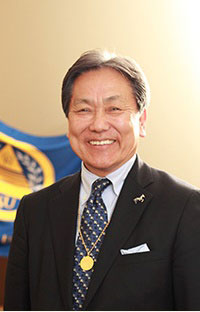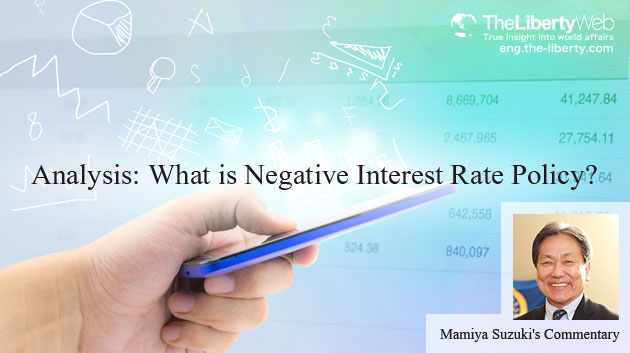Analysis: What is Negative Interest Rate Policy?
Mamiya Suzuki's Commentary
The Bank of Japan (the central bank) recently introduced negative interest rate policy; but what is negative interest rate policy? And what will happen if the Bank of Japan does not abolish it?
Mamiya Suzuki, Dean of the Faculty of Successful Management at Happy Science University (HSU), provided a simple explanation. This article is part 1 of 2.
The Rules Regarding Interest on Private Banks’ Money Deposited as Reserve at the Bank of Japan
The Liberty Web English (LWE)~ What exactly is negative interest?

Mamiya Suzuki
Mamiya Suzuki is Dean of Happy Science University (HSU) and Professor of Successful Management Department. He was born in 1954. After completing postgraduate studies at Waseda University, he became a professor of politics and economics at Seigakuin University. In addition to his specialized area of finance, he has extended his research into political theorists such as Schumpeter and Hayek. He’s published a book titled “Japan Will Win in this Disparate Society” with IRH Press, and has co-authored books such as “Monetary Theory in a World of Chaos” and “Introduction to Finance”.
Mamiya Suzuki (MS) ~ I will explain some prerequisite knowledge needed to understand negative interest. This negative interest that the Bank of Japan has introduced is related to reserve ratio operations, one of the Bank of Japan’s financial policies. This reserve ratio operation is when the Bank of Japan handles money that is deposited to them by other private banks.
Private banks collect deposits so they can loan out money, but if they collect $10 billion and loan out $10 billion, there is no emergency money left in their safes. This is why these banks deposit some money at the central bank (the Bank of Japan), so they can use it if need be.
For instance, if a private bank has no money in its safe, the bank will not be able to hand out money when someone wants to make a withdrawal. This is why, if someone deposits $100 million at a private bank, 1% of that money, $1 million in this case, automatically gets deposited at the Bank of Japan. This system stops private banks from loaning out all of their collected money; and they can still loan out the remaining $99 million.
The Bank of Japan decides the percentage/ratio of the required automatic deposit, and there is no accrual of interest on that money. This is what the reserve ration operation is. Banks have been depositing more money in the Bank of Japan than this formula allows, and the Bank of Japan is now directly handling that money.
A System that Makes Financial Institutes Lazy
The Liberty Web English (LWE) ~ If a lot of money is deposited into the Bank of Japan, private banks won’t have any money to loan out. Doesn’t this mean the banks won’t profit from the interest?
Mamiya Suzuki (MS) ~ Right now, there are very few opportunities to loan out money, so it is better for these banks to keep money in the Bank of Japan. This is because the Bank of Japan pays them interest for the extra money that exceeds the 1% rule. So, keeping money deposited at the Bank of Japan is safer, more secure, and more profitable. When private banks realize this method, they become lazy.
This sort of thing is very rare though. These private banks are obliged to loan out money, but since experiencing bad debts after the bubble burst, they have become increasingly cautious regarding loans. Behind them lies a nuisance called the Financial Services Agency, which demands banks to recall loaned money as soon as businesses show signs of bad debt. This makes it bothersome for banks to loan out money. The Financial Services Agency should be eliminated as soon as possible.
The Negative Interest Rate Policy Will Decrease the Amount of Money Deposited at the Bank of Japan
The Liberty Web English (LWE) ~ How is this related to negative interest rate policy?
Mamiya Suzuki (MS) ~ The Bank of Japan decided to introduce a negative interest rate policy in order to decrease the money in deposit. It is the bank’s way of saying, “Stop depositing money here, and loan it out to people.”
Here’s an example: let us suppose that when Mr. A goes to M-bank and deposits money, he gets 0.1% interest. This of course means Mr. A makes an additional 0.1% of his deposited money. When negative interest rate policy is introduced, however, M-bank takes away 0.1% of his deposited money as a safekeeping fee.
Usually, banks and depositors follow a loan agreement where the borrower pays the lender. So, when Mr. A deposits $10,000 at M-bank, it means that Mr. A has lent M-bank $10,000. This is why Mr. A gets to keep the interest.
If you were on a road trip, and decided to keep your luggage at some public lockers, and on retrieving it, you ask the locker owner to pay you $3, the owner is sure to get angry. So, with negative interest rate policy, the depositor pays. It means you pay a safekeeping fee. When you deposit, the bank takes interest from you.
The Liberty Web English (LWE) ~ That doesn’t sound enticing!
Mamiya Suzuki (MS) ~ No, but that was a downsized example. Private individuals can’t make these kinds of deposits into reserves banks (such as the Bank of Japan), so don’t worry. This negative interest applies only to private banks that deposit at the Bank of Japan. These banks will start to withdraw money from the Bank of Japan because they will not want to pay the fee.
The Bank of Japan Has Gone Insane
The Liberty Web English (LWE) ~ you told us that the Bank of Japan introduced the negative interest rate policy to decrease the amount of deposited money, to make it available for use in the market.
Mamiya Suzuki (MS) ~ Yes. In this sense, it will be affective. But this time, the Bank of Japan has disrupted the long historical economic tradition of paying interest to depositors. In other words, they denied economics altogether. They have gone insane. This was the one thing they shouldn’t have done. What happens with negative interest rate policy is that they lose all grounds for the existence of interest. That is, the spirit of capitalism disappears.
It is wrong if you have money returned, and it’s less than the money you lent. It is wrong if you get more interest the more you borrow. This goes against business ethics.
If we think ‘negative value’, it will become clear how absurd negative interest is. For example, if we suppose that a parsnip is $1 each, we can of course buy 1 parsnip for $1. It means that the fee for the parsnip is $1 each. If the parsnip were minus $1, what would happen? When we buy 1 parsnip, we also get $1 with it. Such a grocer is surely insane.
Interest is the fee that is paid when money is borrowed. If there is no fee, it is not trade. So, if the fee is a negative value, trade doesn’t work. This is currently only happening between private banks and the Bank of Japan, but there is still a possibility that private banks will begin to do the same with individual depositors. If this happens, they are no longer bankers, but monetary warehouses.
The U.S. uses negative interest in one sense because banks take a safekeeping fee if the deposit is under a particular amount. The Bank of Japan, having adopted a negative interest rate policy, could become bad encouragement for Japanese private banks to become like those American banks. They could easily start to adopt a kind of system where they demand safekeeping fees if total deposits fall short of $1,000 for instance. This would be a type of property tax.
In the End It’s about Buying Government Bonds
That being said, I think private banks will withdraw their money from the Bank of Japan and start loaning it out. The future is bleak considering that people were put off from borrowing money even while it was still a zero interest policy. In this case, banks will begin to buy government bonds. So all in all, the Bank of Japan’s plan will work out. But we really need to ask ourselves whether it’s okay to use methods that go against the system of business in order to fulfill our goals. I don’t agree.
The Liberty Web English (LWE) ~ In addition, we can hardly say that government bonds are being used effectively.
Mamiya Suzuki (MS) ~ They use it on social security. The problem is not the interest itself, but the fact that people have no desire to borrow. Years ago when I was still a child, banks had a standard interest rate of 3%-5% for deposits and an 8%-9% interest for long-term loans. There were many people willing to borrow money. They borrowed not because the interest rate was low, but because they had the desire to.
People have lost the desire to borrow money because it’s hard to determine future prospects. People set up home loans because they can see prospects in the future; people who work by the day wouldn’t think of homes loans or buying houses. The important thing is whether economic prospects are bright or not. If people have hope in a bright future, money will circulate. On the other hand, if people don’t have hope in the future, it doesn’t matter how much money one may have, borrowing and the circulation of money will be out of the question.
What the Bank of Japan and the Japanese government must do in this case is to establish policies and prospects that companies and individuals would want to invest in, even at the expense of borrowing money. Empty methodology like the negative interest rate policy is no good.
Untruthful Charts that Make It Easier to Raise the Consumption Tax
The Liberty Web English (LWE) ~ But why did this have to happen now?
Mamiya Suzuki (MS) ~ It is a policy countermeasure for the current economic conditions. Japan’s GDP is negative, so they need to raise the commodity price to make the GDP a plus value. There can be huge hoards of money in the Bank of Japan, but it means nothing if it doesn’t flow into the market, which is why they tried to return the money to the private banks. If even a little bit of money flows into private hands, commodity prices will rise.
In addition, the Governor of the Bank of Japan, Haruhiko Kuroda, has been supportive of a weak Japanese yen. He hates a strong yen. Part of the money that private banks can no longer keep at the Bank of Japan goes to buying government bonds, but another possibility is for use in the foreign exchange market. If the supply of yen increases, its value will drop.
Also, Japanese banks buy stocks. Security investment in Japan is a huge sum. So the possibilities are buying government bonds, use in foreign exchange, or buying stocks. This will make the yen weaker and stock prices higher, so government bonds can be absorbed, which will in turn make it easier to raise the consumer tax to 10%.
The Liberty Web English (LWE) ~ So, this creates untruthful charts that make it easier to raise the consumption tax.



















